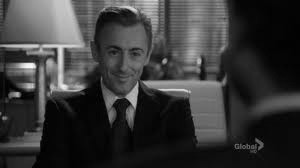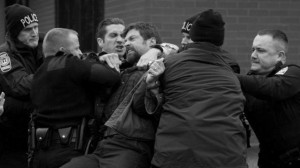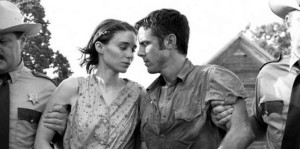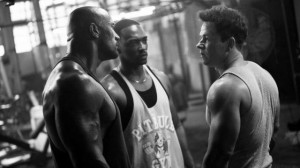by timbaros
 I walk into a junior suite at the Soho hotel and meet the publicist. Alan Cumming is nowhere to be seen but I am told that he is in the bathroom. After a couple minutes of chatter with the publicist, Alan Cumming appears. He is wearing a red velvelty button down shirt, black trousers, his hair is spiky, his face as clear and white and smooth as a baby’s bottom, and he displays his usual cheeky ear to ear grin. We sit down to chat:
I walk into a junior suite at the Soho hotel and meet the publicist. Alan Cumming is nowhere to be seen but I am told that he is in the bathroom. After a couple minutes of chatter with the publicist, Alan Cumming appears. He is wearing a red velvelty button down shirt, black trousers, his hair is spiky, his face as clear and white and smooth as a baby’s bottom, and he displays his usual cheeky ear to ear grin. We sit down to chat:
I hand him a copy of the previous Pride Life magazine
Tim Baros: Thanks for your time. I appreciate it. You look great! My god, different from the film. In it you had long hair, sometimes.
AC: Ah yes, terrible.
TB: during the drag scenes, you know.
AC: Oh that hair, yes.
Tim Baros: That was a great film. I loved it.
AC: Thank you.
Tim Baros: I saw you in Cabaret in New York back in 1998.
AC: You did? Where are you from:
TB: New York, actually, I lived downtown. But I live here now, nearby, but I am from New York.
AC: Where in downtown?
TB: 14th & 8th I lived for like 15 years.
AC: I used to live at 14th & 8th.
TB: No way?
AC: Between 7th & 8th.
TB: Oh my god, ok. I never ran into you. I was there from 1994 to 2003.
AC: Ah funny.
TB: Yeah, so I lived at 252 W. 14th street, above Nell’s.
AC: I lived at 222, I lived in the Sequioua.
TB: Ah yes, the posh building. I lived in a 5 story walk up.
AC: I had a elevator.
TB: I never ran into you, I am surprised.
AC: My friend Eddie actually still lives in that building, he was right next door to me. He still lives there.
TB: Right, ok.
AC: I now live in the East Village, though.
TB: Ah, very trendy, very edgy.
AC: Very edgy.
TB: Lucky you. Did you go to the Associated Grocery Store across the street?
AC: Yes, of course.
TB: Do you remember Tequilas? The restaurant next door to the Associated?It’s a Mexican restaurant. I used to go there all the time.
AC: It’s called something else now.
TB: Well the building’s been knocked down and it is something different.
AC: There still is a, a Spanish place.
TB: That’s downstairs. That’s the church next door.
AC: Next door, behind the stoop.
TB: Yeah, behing the stoop.
AC: The posh club, what’s it called, Norwood House. It’s kind of like
TB: Member’s club?
AC: Yes, members club.
TB: That right, yeah year, Excellent.
AC:Well, we meet after all this time.
TB: Exactly.
Well, I’m 48, and you’re 48 as well.
AC: That’s right.
TB: We are the same age. We don’t look a day over 35. Ha!
AC: Ha! (Laughing with a big smile).
TB: Right?
AC: Right:
TB: So how did you get this part in this film? Who approached you first?
AC: Ah, Well, they just asked me, you know, they just asked me. Travis (Fine, the director) talked to, um, my agent or manager or something and I just got asked to do it, and they sent me it. My manager was actually, really, she was um, very um, you know, there was something, sometimes you think this is why they get all this money. Because they sometimes do things where they give you really good advice and say read this now, instead of you know this has been sent to you so she was she was very passionate about it and um, so I read it, and I met Travis initially, talked about it, and that was the start of the process.
TB: Did Travis say you were his first pick? Hopefully he said that to you.
AC: ah right (Laughing)….I am sure he did. I am sure I was.
TB: He saw the role of Alan Cumming and no no no , definitely for him.
AC: Right. I am not too sure if I was the first pick but he was disa, disabused, disavowed, or what, disabused of his, disabused, of his first choice.
TB: Yes, exactly, and you got it. And it’s a great film.
AC: I like it. Yes, I am attached. And then what was great was I was able to, ah, because I, you know, there were several drafts of it after I came on, so I got to kind of be part of that process in the way of just, which was really good, because you know, something like this is shot so fast and such a short time so it was nice to be to have it entrenched in me, to discuss it a lot, each draft, to talk about the character, it changed quite a lot actually from the time I came on until the time it was shot. The ending was completely different.
TB: I was going to ask that later. When was the film shot?
AC: it was shot two summers ago.
TB: 2011
AC: Yeah, I guess.
TB: So it’s been a while since you’ve done it.
AC: Yeah
TB: Yeah, exactly, 2 years
AC: A long time
TB: Does it feel like it was yesterday?
AC: Ah, no
TB: No (Laughing), not quite.
AC: Right (Laughing) but It feels like I’ve, ah, it feels, cause its, you know, one of these films that I guess because it is smaller it did the all festivals and it came out and sort of what do they call it a platform thing
TB: Trajectory kind of sort of
AC: Well, it you know it starts in different markets and it feels like I have been talking about it for a long time.
TB: Ah, right, ok. It still relevant.
AC: Yeah sure, I love talking about it’s just its been you know, it feels like I, that’s actually the last movie I’ve done it was this one, apart from a wee cameo in a friend’s thing.
TB: You did MacBeth this past summer
AC: The past two summers I actually did in Glasgow and New York last year and then I am going to do it this year.
TB: Busy boy. Time for a break. possibly
AC: I’ve got a week off in September actually.
TB: Ah great, ok. Staying in New York or
AC: I’m going to Provincetown
TB: I’ve been there, I love that place.
AC: Me too. it would be quieter then. And then, um, Santa Fe, I’m going to this great thing.
TB: You’ll never guess where I am actually from?
AC: Santa Fe?
TB: I grew up in Santa Fe. I was born in 1964 in Santa Fe.
AC: Wow!
TB: I left when I was 21 to go to college in New York.
AC: That’s funny.
TB: I stayed in New York and then came to London. So wow, you are going to Santa Fe?
AC: I am going to Santa Fe to this thing the head of, um whatchamacallit, Amazon does this thing where he invites all these different types of people, artists and writers and scientists and just people to this thing and you just go and talk
TB: Is it like an institute, like a pow wow kind of sort of
AC: kind of, we sit around and chat, there is no press, a campfire
TB: You’ve been there before?
AC: No
TB: You are going to love
AC: Ah Santa Fe I have been to before I went one to this film festival that was there. But Amistead Maupin, you know him, he said, uh, I just recently read one of his books, I mean an audio book of one of his books, and he said oh gosh Alan you should to this because eh, I, he said he had sat around the campfire talking to Neil Armstrong about what it like being on the moon.
TB: Oh wow! As one does.
AC: So that’s uh, that’s my week off.
TB: OK. Have lots of great Mexican food, lots of great Indian food, tamales, tacos, just stuff yourself. ok.
AC: I will.
TB: Can you do that for me? Because I live here and they don’t really have great Mexican food.
AC: Yeah, it is not so big here.
TB: Yeah, not so big here, no no…
AC: We’ve got, ah, from our living room I can see a little Mexican place
TB: In the East Village
AC: San Loco, and I , we uh I and actually they are so good because when I am drunk and I go there and we always, and we go to San Loco, and then when I was doing MacBeth I went to a nutrionist to just be, because it was crazy demanding so I went to this nutrionist to check to if everything was alright, if I was eating right, I’m vegan as well so and she said she basically said you know having a bean taco is great food to have. Yeah!!!
TB: So going back to the film, was that actually you singing in the film? Was that your actual voice? I mean it was really smooth, tender, emotional, in the moment voice,
AC: That me!
TB: That’s you? I mean are you classically trained as a singer as well an actor or?
AC: Well, no, I’ve got singing lessons at drama school, um, but I mean, I guess, no, I don’t know, would I, suppose so, singing is the same thing as voice, so but you know I’m not really, over the last few years I’ve got more, you know, I started singing, I do concerts and stuff, and a record,
TB; Yes, you’re a singer, plus Cabaret as well, and you sang.
AC: I’ve done a lot of singing, actually.
TB: So what you do prefer? Do you prefer acting in movies or do you prefer being on stage or singing like on a record because you do so many different things.
AC: I like them all. I I I you know, I like to be able to do different things, I bounce back and for so I’m always quite when it comes to do something I am always quite excited to be because it is not what I’ve just been doing. But you know, if I had a gun to my head I would choose the theatre.
TB: Do you have any plans for any productions in the future?
AC: Uh, there’s plans but there is nothing you know, I’m just a, one thing I am not allowed to talk about it, it ah, it’s about, there’s always plans, there’s always things, there is something coming up but I’m not going to say what it is.
TB: Fair enough
AC: It is not officially announced yet
TB: Not in Santa Fe?
AC: Not in Santa Fe, no, on Broadway.
AC: (he sings) On Broadway…
TB: Good, I will come and see you. hopefully, next year, you never know when.
AC: Yeah, hopefully next year.
TB: I sat next to you at a GLAAD Media Awards show as well, not next to you but at the table next to you.
AC: When was that?
TB: Back in late 90’s. I used to go to all of the GLAAD events of the year, the media awards and I sat at the table next to you, and you and I like looked at each other for like a brief second, and I still have that in my head. It’s really funny because you turned around and looked and I sitting there and you looked at me then you turned back and then I was thinking what was he looking at. You don’t remember that obviously I remember that obviously but you don’t….it was back in 1999.
AC: That makes sense, was I hosting or presenting?
TB: No, you were actually sitting at a table, a front table near the stage and I was at the table behind you. That was my one brief moment of looking at each other….
TB: The boy who plays Marco in the film, I mean he’s amazing, he is brilliant. How was he on set? To like deal with and to work with?
AC: Lovely. I mean, you know, I was kind of anxious, not really anxious but a little trepidatious just going into it thinking you know I don’t know really what it means to work with someone with Down’s Syndrome, what it was going to be like and what would that mean about my day daily working procedure, you know. Just, he was absolutely a darling, more professional then either guy or I, he was absolutely lovely. One of the best things about this film was meeting Isaac. Really, it was absolutely beautiful thing, I feel really lucky to have had that experience. He just reminds you of what joy is like. He was so happy he would jump up and down with happiness.
TB: And he is a great actor..
AC: and he is a GREAT actor
TB: His role was amazing. Was he easy to work with in that respect. To act off of?
AC: Yeah yeah he was really, I mean we talked, Travis is a really great one too, they spent a lot of time together so and then they got, you know, really had a laugh, became friends, and, but it was always so easy to, and then there was a sad bit in the film where we show him his bedroom for the first time with all the toys, so and, at that moment, he cries, but that was not in the script. He wasn’t supposed to be. He was just so happy, just so happy as Marco that he just burst into tears and so we had rehearsed the scene and we didn’t think that that was not what was going to happen, and so I as me, as Alan, went over to him and actually, you know, kind of quietly, I am just talking as myself, not talking as Rudy Donatello, I go ‘are you ok’, like that, as me, and they kept it in, they kept it in. And he was crying….blah, and it was lovely. I mean, it was just great. I just loved, and his face when he would see you lighting up, and then you know seeing him a lot at the film festivals and the openings and things. The opening when the film opens in at the premiere at Tribeca he came up and was just weeping. We are all used to it now because he is a weeper, he is a crier, we say ‘Oh Isaac’ and um, but it was, he was so happy that he was just weeping. and uh, the audience had just been through this traumatic experience and then they see the person they had just been watching now weeping.
TB: Are you still in contact with him now after two years later?
AC: Yeah, email, I email his mom, sent him a video. I think the last time was at the GLAAD Awards in San Francisco, I was not able to go because I was in Macbeth but the film won the award and Travis sent me a video of him dancing at the afterparty, and just like cutting a rug.
TB: Good for him! He’s living it up. He’s an actor, he’s famous.
AC: He’s a great star.
TB: He is great in the film, he is amazing. I cried at the end of the film obviously because of what happens at the end. Was that in the original script?
AC: No
TB: His death at the end…That was really shocking.
AC: It was not in the original draft I read, it evolved into a being a more sort of realistic ending.
TB: Why did they change the ending because I expected it happy ending because you know when you go to the cinema gay couple or just a couple in general in adopting a kid is going to have a happy ending. This one did not have a happy ending.
AC: Because happy endings don’t happen in real life. and that stops the film from being a little schmaltzy because you get a slice of, you know you’re hoping, you really hope that you get one of those endings, you really route for the family and for them to get back together and in a sort of a Hollywood ending, that would happen that way but in a real life ending for those people,for a gay couple that time or even now that is the reality and that is I think what makes it so heart wrenching, the truth.
TB: So you think this is still happening today? 1979 is different from 2013. Lots of problems with gay couples adopting children. Obviously there are but it is getting easier. In some respect.
AC: It is getting easier but its not getting easier through the state system. Lots and lots of, there’s a million, you think, you know, there’s a million families with same sex experience in America. But a very small percentage of those have been adopted through the state system. Thats, you know, its not like, Rudy and Paul, a gay couple who’ve got, who can go to Guatemala and they didn’t, that wouldn’t even been an option for them in those days, but it just happened, and it could, that is something so awful I think, in Britain when its legal to adopt through the state system, you know, you still have to face, it still is harder, the prejudice of each individual council and
TB: Back in the 70’s it was harder for a gay couple to adopt a kid, they didn’t even think about it, because it was pretty much impossible.
AC: Yeah, exactly, but thats great, but its sort of like I think it’s too easy to sort of think oh, it’s great, things have changed alot but still in America because I sort of said that in some things, there was, well you know the head of my school is got ah..he is with his partner they’ve got a child they adopted blah blah blah and I said was that adopted through the state system? and they’re like, ah, no, they got it from something you know, and, that’s that, for me I think obviously great strides have been, great things happened recently with the supreme court thing and everything but I’m, I’m I’m not going to applaud just because I’ve been given my rights, I don’t think, it’s, that’s not right you know, just because equality is not, ah, a privilege.
ANY DAY NOW Review:

Rudy Donatello works as a drag queen by night but still finds it tough to make ends meet. Out of the blue Paul Fleiger (Garret Dillahunt) walks into the bar and into his life, while at the same time, the boy next door is having family problems, in the new gay drama Any Day Now.
Donatello, played sympathetically and with gusto by Alan Cumming, sings at a gay nightclub in 1979 West Hollywood with two other drag queens who are his back up singers. One night, Fleiger walks into the bar and is immediately smitten with Donatello. Why? It is not clear. Perhaps it is love first sight? Meanwhile, Donatello’s next door neighbor, Marianna (Jamie Anne Allman), is a drug dealer and sex addict who has a young son who has down’s syndrome. One night she gets arrested, leaving her son alone in the apartment. Donatello discovers the boy alone, so he has the boy come to stay with him temporarily until the situation with his mother becomes more clear. Meanwhile, the relationship with Fleiger is getting more and more serious, with both men quickly falling in love with each other.
Social services ends up getting involved and puts Marco into a foster home, making Donatello realize that he and Fleiger are fit to take care of the boy, especially after Fleiger asks Donatello to move in with him, thereby providing a stable home for Marco. However, social services thinks otherwise and digs out every dirty detail they can find about Donatello and Fleiger’s relationship to make them look like unfit parents, gay being one of the details. When the mother is suddenly sprung from jail in a plea bargain with the district attorney, with all the counts dropped, all hope seems to be lost in keeping Marco.
Any Day Now is a truly sympathetic and a well done and very current film on the trouble that gay couples have in adopting children.
Cumming gives one of his finest performances in years as the drag queen by night who at first seems lost in life but then finally finds happiness and a family at the same time. Girant, an American actor previously seen in Killing Me
Softly and Winter’s Bone, is also very good as a closeted lawyer who very slowly comes out after finding love with a man for the first time, building his confidence. More a revelation is Isaac Leyva as Marco. An actor with Down’s Syndrome, his performance is so touching, so emotional, so professional that acting seems to be natural for him. The script, by Director Travis Fine and George Arthur Bloom, is very timely and believable, while Fine’s direction is sharp and crisp. Any Day Now is a very touching and moving film.
Any Day Now was released in cinema’s on Sept. 6 and will out on DVD in Jan, 2014.
 Justin Timberlake is a Princeton college student who is addicted to online poker and loses quit a lot of money, while Ben Affleck is the site’s corrupt owner, in the new film Runner Runner.
Justin Timberlake is a Princeton college student who is addicted to online poker and loses quit a lot of money, while Ben Affleck is the site’s corrupt owner, in the new film Runner Runner.
















